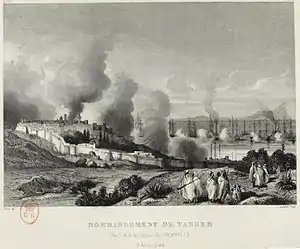Franco-Moroccan War
The Franco-Moroccan War was fought between France and Morocco in 1844. The principal cause of war was the retreat of Algerian resistance leader Abd al-Qadir into Morocco following French victories over many of his tribal supporters during the French conquest of Algeria.
| Franco-Moroccan War | |||||||||
|---|---|---|---|---|---|---|---|---|---|
 Painting of the Bombardment of Tangier. | |||||||||
| |||||||||
| Belligerents | |||||||||
|
| |||||||||
| Commanders and leaders | |||||||||
|
|
| ||||||||
| Strength | |||||||||
|
15,000 troops 15 warships |
40,000 cavalry 300 artillery | ||||||||
| Casualties and losses | |||||||||
|
41+ killed 163 wounded[1] |
1,150 killed 28 cannons lost | ||||||||
Background
Abd al-Qadir had begun using northeastern Morocco as a refuge and a recruiting base as early as 1840, and French military movements against him heightened border tensions at that time. France made repeated diplomatic demands to Sultan Abd al-Rahman to stop Moroccan support for Abd al-Qadir,[2] but political divisions within the Sultanate made this virtually impossible.
Tensions were heightened in 1843, when French forces chased a column of Abd al-Qadir supporters deep into Morocco following the Battle of the Smala. These men included tribesmen from Morocco, and French authorities interpreted their actions as a de facto declaration of war. While they did not act immediately, French military authorities threatened to march into the Sultanate if support for Abd al-Qadir was not withdrawn, and the border between Algeria and Morocco properly demarcated so that defenses against future incursions could be set up.
An attempt to dislodge these troops peacefully in late May 1844 failed when Moroccan tribal fighters fired on the French and were eventually driven back to Oujda. Rumours surrounding this incident, including reports that the shrine had been defiled and that French troops had entered Oujda and hanged the governor, fanned the flames of jihad in Morocco. Amid escalating troop buildups and skirmishes in the frontier area, French Marshal Thomas Robert Bugeaud insisted that the border be demarcated along the Kiss River, a position further west than the Tafna River, which Morocco considered to be the border.[3] On the 19th of June, violating the frontier, Marshal Bugeaud occupied Oujda.[4]
War

The war began on August 6, 1844 when a French fleet under the command of the Prince of Joinville François d'Orléans conducted a naval Bombardment of the city of Tangier.[5]
The conflict peaked on August 14, 1844 at the Battle of Isly, which took place near Oujda.[6] A large Moroccan force led by the Sultan's son Sidi Mohammed, was defeated by a smaller French royal force under the Governor-General of Algeria Thomas Robert Bugeaud.[7]


Essaouira, Morocco's main Atlantic trade port, was attacked in the Bombardment of Mogador and briefly occupied by Joinville on August 16, 1844.[8][9]
Aftermath
The war formally ended on September 10, 1844 with the signing of the Treaty of Tangier,[10] in which Morocco agreed to officially recognize Algeria as part of the French Empire, reduce the size of its garrison at Oujda, and establish a commission to demarcate the border. The border, which is essentially the modern border between Morocco and Algeria, was agreed in the Treaty of Lalla Maghnia.
See also
References
- Pierre Montagnon, The conquest of Algeria: The seeds of discordie, 2012.
- Churchill, Charles Henry (1867). The Life of Abdel Kader, Ex-sultan of the Arabs of Algeria: Written from His Own Dictation, and Comp. from Other Authentic Sources. Chapman and Hall. p. 236.
{{cite book}}: CS1 maint: date and year (link) - d'Ideville, Henri (1884). Memoirs of marshal Bugeaud, from his private correspondence and original documents, 1784-1849, ed. from the Fr. by C.M. Yonge. p. 113.
- d'Ideville, Henri (1884). Memoirs of marshal Bugeaud, from his private correspondence and original documents, 1784-1849, ed. from the Fr. by C.M. Yonge. p. 118.
- Navies in modern world history Lawrence Sondhaus p.71ff
- Hekking, Morgan. "The Battle of Isly: Remembering Morocco's Solidarity With Algeria". Morocco World News. Archived from the original on 2020-09-22. Retrieved 2021-08-11.
- Pennell, C. R. (2000). Morocco Since 1830: A History. C. Hurst & Co. Publishers. p. 49. ISBN 978-1-85065-426-1.
- Paterson, Alexander (1844). The Anglo American, Volume 3. p. 520ff. Retrieved 2010-08-24.
- Houtsma, Martijn Theodoor (December 31, 1987). E.J. Brill's First Encyclopaedia of Islam, 1913-1936, Volume 9. Brill. p. 550. ISBN 978-90-04-08265-6. Retrieved 2010-08-24.
- "'Abd ar-Rasham". Encyclopædia Britannica. Vol. I: A-Ak - Bayes (15th ed.). Chicago, Illinois: Encyclopædia Britannica, Inc. 2010. pp. 17. ISBN 978-1-59339-837-8.
- Bennison, Amira (2002). Jihad and its interpretations in pre-colonial Morocco: state-society relations during the French conquest of Algeria. Routledge. ISBN 978-0-7007-1693-7.